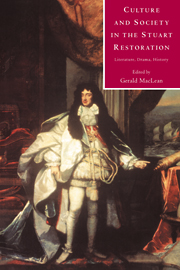Book contents
- Frontmatter
- Contents
- Notes on contributors
- Acknowledgments
- Abbreviations and note on the text
- INTRODUCTION
- PART I DRAMA AND POLITICS
- PART II AUTHORSHIP AND AUTHORITY
- PART III WOMEN AND WRITING
- 9 A woman's best setting out is silence: the writings of Hannah Wolley
- 10 Obedient subjects? The loyal self in some later seventeenth-century Royalist women's memoirs
- PART IV EMPIRE AND AFTERMATHS
- Index
9 - A woman's best setting out is silence: the writings of Hannah Wolley
Published online by Cambridge University Press: 20 August 2009
- Frontmatter
- Contents
- Notes on contributors
- Acknowledgments
- Abbreviations and note on the text
- INTRODUCTION
- PART I DRAMA AND POLITICS
- PART II AUTHORSHIP AND AUTHORITY
- PART III WOMEN AND WRITING
- 9 A woman's best setting out is silence: the writings of Hannah Wolley
- 10 Obedient subjects? The loyal self in some later seventeenth-century Royalist women's memoirs
- PART IV EMPIRE AND AFTERMATHS
- Index
Summary
Hannah Wolley (or Woolley) has been much celebrated in twentieth-century accounts of Restoration women, and stories about her life have been repeated frequently. It seems she was the first British woman to publish cookery books, her career beginning with The Ladies Directory (1661, 1662) and progressing, it is usually thought, through eight different titles by 1675, some of these works coming out in several editions and two of them, The Queen-Like Closet (1670) and The Ladies Delight (1672), being translated into German. She is found to be of particular interest because her later books contain not just recipes and medical remedies, but also more general advice on the proper running of a household, guidance on letter-writing, some lengthy autobiographical passages, and trenchant opinions on the restrictions imposed upon the female sex in Restoration England. It is not surprising, then, that this century's tradition of feminist or woman-centered scholarship has taken an interest in Wolley: she was referred to warmly by Myra Reynolds in The Learned Lady in England 1650–1760 in 1920, and by Ada Wallas in Before the Bluestockings in 1929, and their accounts served as the basis for those appearing in works by Kate Hurd-Mead, Doris Stenton, Hilda Smith, Patricia Crawford, and Antonia Fraser, to name only the most prominent.
- Type
- Chapter
- Information
- Culture and Society in the Stuart RestorationLiterature, Drama, History, pp. 179 - 200Publisher: Cambridge University PressPrint publication year: 1995
- 2
- Cited by



